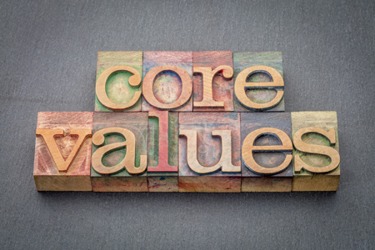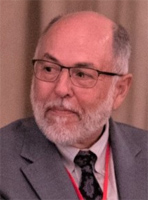The Final 4 Core Values For Working In The Outsourcing Space

By Louis Garguilo, Chief Editor, Outsourced Pharma

We’ve reached the final four of the eight core values devised at a CDMO some years ago: ethics; good citizenship; professionally rewarding workplace; and safety. As we've been learning, all of these can still be applied universally today.
In fact, maybe they are needed more than ever.
These core values originate with Tom D’Ambra, co-founder and former President, CEO and Board Chair of Albany Molecular Research, Inc. (AMRI) (now Curia). Today, he’s President & CEO of Pharmapotheca A, Inc., a pharmaceutical development company, putting him on the side of the drug sponsor.

5. Ethics – Actions, words, or deeds which reflect a conscious unyielding commitment to the highest moral principles, policies and values, placing them ahead of personal or corporate gain.
Nowadays, D’Ambra is concerned with the questioning of ethics in society, and how this impacts employees and businesses.
There’s the constant media drumbeat of powerful people or organizations that have “ignored basic principles of morality.”
He harkens back to the “broken windows theory” that says minor transgressions left unattended affect attitudes and lead to more and bigger transgressions.
“This is true of business ethics. The small lapses we allow or overlook lead to bigger ones. Frankly, if it’s wrong, don’t do it, or don’t allow it,” D'Ambra says.
An ethical business culture “starts off the right way with the people you decide to hire, and to promote.”
Key is understanding how your organization is fulfilling its mission.
“It's like getting a speeding ticket when driving too fast,” D’Ambra analogizes. “Folks look to ‘get out of it.’ Somebody knows someone who can ‘fix it.’
“I’m guilty!” he confides. But these lapses, he feels, seem to have coalesced in our society “to where bending the rules is too common.”
Certainly, no reader wants a CDMO cutting “ethical corners,” or uncommitted to upholding the highest standards.
Leading us to the sixth core value.
6. Good Citizenship – The consistent, professional, and considerate treatment of others.
When this value was created decades ago, some might have seen it as overstretch –not quite related to guiding principles for a specific organization and its employees.
Today, though, “Good Citizenship” is much discussed in business.
D’Ambra starts our discussion by focusing on our service industry.
At organizations that benefit from working with other organizations, he says, “You get to see how those other groups operate. You can import best practices, or on the other hand, see the results of certain values being ignored.”
“I remember every so often dealing with prospective or current customers in what you might describe as ‘toxic organizations,’ full of politics, backstabbing, and unhappy people.
“Good Citizenship is an important part of employee engagement and retention, not to mention company and personal reputation.
“In business, it’s often demonstrated in peer-to-peer interactions, or when working with external partners.
“It doesn’t matter if a person reports to you, or you to them. It doesn’t matter if that person is in another organization. Considerate treatment of all others makes you a good citizen in all you do.”
In any situation, position, or walk of life, suggests D’Ambra, “this value is simply how you treat others.”
7. Professionally Rewarding Workplace – An environment which provides resources and opportunities to succeed, and achieve job satisfaction, in both an individual and team manner.
This core value can serve to combat the employee turnover many are experiencing today, or if not practiced, add to the challenge.
In fact, D’Ambra says, all these values were created and adopted at a somewhat analogous time.
“You were there when the great recession hit [in 2008-09],” D’Ambra says to me of that timeframe when we both were at AMRI, and employees were on the move.
“Luckily, we had put some initiatives in place beforehand to keep as many of our best people as we could,” he recalls.
Those initiatives included presenting and displaying awards to recognize high-achievement by employees and teams – at every level of the organization. We published newsletters to step-up communications among global locations.
“When employees work hard and do a good job, they want and deserve to be recognized,” says D’Ambra.
“You don't have to throw money at people all the time,” he says. “Take an interest in their personal lives, thank them for a job well done. Let them know you support and value them.”
----------------
A personal example:
During a BD trip to Japan, D’Ambra and I were in the back of a taxi heading to our next meeting.
“How’s Naoko doing,” he asked, referring to my wife.
“Really well,” I replied. “Actually, it’s her birthday tomorrow.”
When I phoned Naoko back in New York the next day, she said, “I just received a beautiful flower bouquet.”
D’Ambra had emailed our home office to send them to her – and ensure they arrived on time.
----------------
To be clear, D’Ambra isn’t diminishing the importance of compensation – particularly in the current macro-economic environment.
“Compensation is obviously important,” he says. “For people at all points in their careers, compensation is a vital part of their ability to grow and achieve goals in their lifetime.”
However, it is also important to recognize “people want to work within a high-performing organization they can feel proud of.”
And finally: “Investment in leadership development and training are priorities never to be ignored.”
8. Safety – An on-going and proactive commitment to provide the resources and work environment that promotes and facilitates employee, community, and environmental well-being.
We’ll keep this final value brief.
Like Quality, the core value of Safety doesn’t belong to a single organization and is not practiced in specific settings.
If you work for a drug sponsor or service provider – of any size or shape – safety to workers, the product, the end-user, and the environment takes precedence over other considerations.
Maintaining the highest standards of safety might best be accomplished this way:
Ensure you, your employees, and your CDMO follow all the core values that D’Ambra established so many years ago.
-------------------
